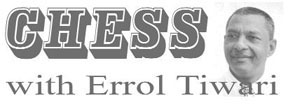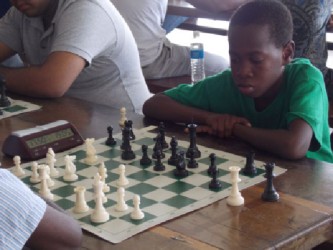It is not difficult to remember a time during the 1970s and 80s, when Maurice Broomes laid a genuine claim to ‘hero status’ in chess circles in Guyana. It is said that himself and President Burnham explored the extraordinary intricacies of the game on many occasions. Broomes was our finest player. Before Broomes , there was HOE Barker, a player who tenaciously strangled the notable English-speaking Caribbean chess nations, and was awarded the coveted title of Carib-bean Chess Champion.

Broomes represented Guyana with distinction at the 1978 Argentina Olympiad and the 1980 Malta Olympiad and at a number of other fora. The losses which he endured in Guyanese tournament chess, could almost be counted on the fingers of one hand. For just about two decades, Sears, Warsali, his brother Gordon, Simpson, Tiwari, Chang-Soong and Greenman were suc-cessful, minimally, against him. I cannot recall for certain whether Michael Marques actually scored a win against Broomes, but Michael Sears would know. Broomes knew more about chess theory than any other player in Guyana at the time. In addition to that, he transferred the machinery of thought from mind to board so skilfully and so quickly when he was in time trouble, that it boggled our minds.
Today, the question which faces us, is: Can we find another Maurice Broomes? I believe that we can. But herein lies a difficulty. We must find a clever way of attracting others to the game. The real reason for the Russian dominance of chess and that of the former Soviet Eastern bloc nations is, of course, their numerical preponderance. Russia has more first-rate players than any other three nations combined. We can ‘suck our teeth’ in defeat and argue that we cannot attract the numbers which would make the difference in the game. But what about Cuba? With a population much, much smaller than Russia and the United States, Cuba has manufactured a ‘super’ grandmaster who has matched skills with some of the best in the world, and who has done his country proud on numerous occasions.
And herein lies another difficulty. Those who know Shiv Nandalall, know that he has an enormous appetite for playing chess ‒ and, of course, for organising chess locally. The same could be said of Loris Nathoo, who continues to facilitate the promotion of chess through sponsorship.

So here’s the thing. Chess is still regrettably in its infancy in Guyana, and certainly has not entered into the ‘Age of Opulence’ as, you might say, have football and cricket. The persons who comprise the organisation of chess are not salaried. In fact they are not paid anything from anywhere. Their love for the promotion of this ingenious game is what takes precedence. Two Sundays ago, the Guyana Chess Federation rented a Rosa bus to transport some juniors and a sprinkling of seniors to participate in the Banks DIH Malta chess tournament at the University of Guyana Tain campus in Berbice. Some enthusiasts were unable to cover the full cost of transportation, and, therefore, the Federation was obliged to pay the difference.
I make this point because some-thing troubling is happening in local chess. Some persons, both junoirs and seniors, are declining to renew their membership of the GCF. They prefer to just turn up and play, although the Federation charges a slightly higher fee as tournament dues for non-members. It seems that the commitment to the upliftment of chess is lacking. The annual membership fee for juniors is $1000, and for seniors, $2000.
The strong players inevitably win the medals, the trophies and the prize money. When another tournament is announced, they commit themselves to this exercise all over again. The pattern remains the same.
But all is not lost. Players can remedy this situation by becoming members of the GCF forthwith. Then they will be contributing to the development of chess in a meaningful way. It’s the only way for chess to progress and prosper. A Federation is only as strong as its membership. Many years ago, as a young chess player, I embraced my obligations to chess and felt a special joy in doing so.
As Fischer once said, chess is life. Perhaps times have changed.
How would you treat non-members of the GCF who have demonstrated an aptitude to represent Guyana in chess? How? A Caribbean chess tournament is scheduled to be held in Guyana in due course. We want our finest players to participate. The country’s pride and honour are at stake. It is not too late to pay our dues to chess.
Then our young hopefuls can seek inspiration from Maurice Broomes!




